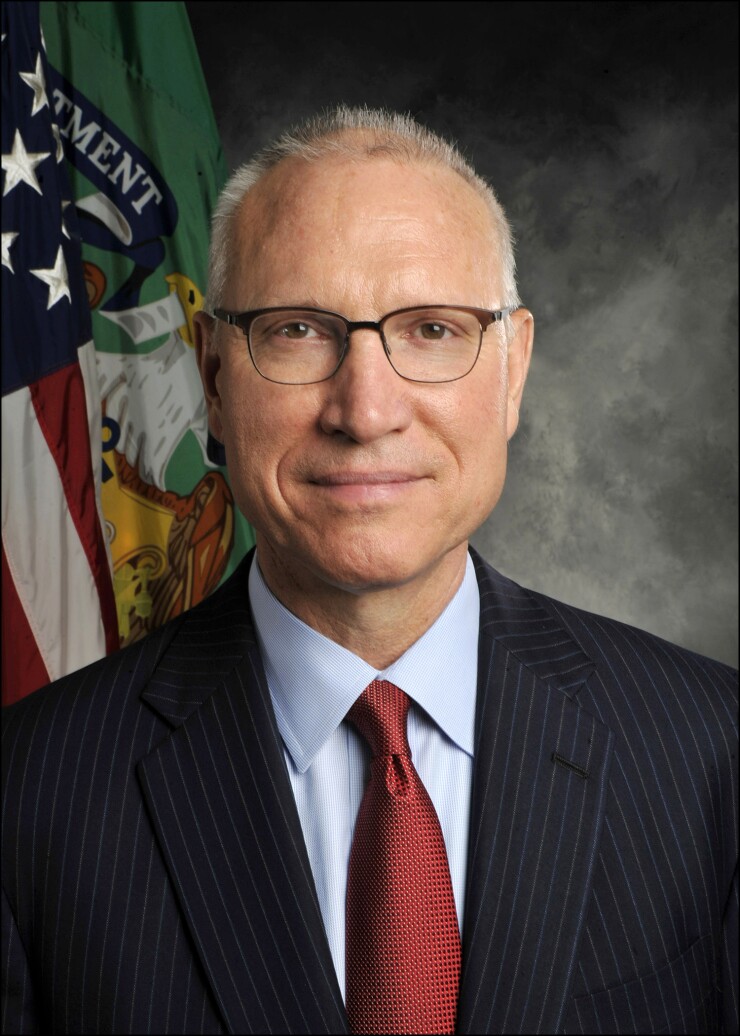The Federal Reserve is prepared to consider additional aid to the municipal market if volatility that it experienced in March/April returns and is needed, a Fed official said..
During the Brookings Institution’s ninth annual municipal finance conference, the Fed’s Kent Hiteshew, veteran muni banker and former Treasury official, told fellow panelists he hoped the municipal market would not return to the volatility it experienced in March when the coronavirus pandemic and its following economic downturn first began.
“My job and our team’s job is to continue to monitor the market and if additional intervention is required, the Fed is prepared to consider it,” Hiteshew said.

Hiteshew also noted that the Fed’s $500 billion Municipal Liquidity Facility will be available “at least through the end of the year,” but emphasized that it is designed to be used as a last-resort backstop.
“I would say we’re pleased with the recovery of the market,” Hiteshew said. “We are remaining vigilant and we don’t think we’re necessarily out of the woods. I would say with regard to COVID and the public health challenges that we face, how that translates into muni credits — I think the fiscal issues that are challenging state and local governments and issuers has only just begun. We’re at the beginning of a new fiscal year, there is always a lag in terms of revenues.”
The MLF was created in April to purchase short-term notes. It expires on December 31, 2020. Prices set for the program solidify the Fed’s position to be a backstop to the muni market since they charge issuers a premium.
Hiteshew also noted he was personally a Build America Bonds fan and wants to see it make a comeback.
As for the future of the municipal market over the next couple of months, Gary Hall, partner and head of investment banking at Siebert Williams Shank & Co., LLC and former Municipal Securities Rulemaking Board chair, is interested to see what comes of reinstating tax-exempt advance refunding.
In an infrastructure bill proposed by House Democrats, they announced plans to permanently reinstate tax-exempt advance refunding. Earlier this month, bipartisan Sens. Debbie Stabenow, D-Mich., and Roger Wicker, R-Miss., introduced a bill to bring back tax-exempt advance refunding.
“We have bipartisan support for this and I never thought this would happen,” Hall said.
After the Fed intervened for the first time in its history to buy municipal bonds through the Money Market Mutual Fund program and then later again with the MLF, it had a signaling effect to the market that the Fed would be an investor if needed, said Patrick Brett, managing director and head of Citi’s municipal debt capital markets.
Since then Brett said banks have become more active in the municipal market as well as foreign investors. Issuers are returning to the market to take advantage of low rates.
“In terms of issuance, for a period of time, you couldn’t sell any sort of COVID-sensitive sector, and kind of one by one everything that seems like just a few months ago we wouldn’t be able to sell, we’ve been able to sell like sensitive transportation sectors,” Brett said.
However, hotels and convention centers are still sidelined.
“Credit analysts are still trying to work through what this means for those,” Brett said. “So we haven’t seen those come fully back.”
Investors are also hungry for more information about issuances. Hall recommended issuers have timely annual financial statements as well as interim financial statements.
Sarah Snyder, managing director at Ramirez & Co., said she is reminding people to expand disclosure in the environmental, social, governance (ESG) space.
“Giving that information to investors will help get them more comfortable to hear what you’re doing,” Snyder said. “We try to reiterate that with our issuer clients and expanding disclosure into that space.”
Meanwhile on Tuesday, the Americans for Financial Reform, along with public officials penned a letter to Fed Chair Jerome Powell asking for changes to its MLF program.
The groups asked for a larger range of municipal borrowers, which is limited now to states and cities and counties with a population of 250,000 and 500,000 respectively. It is also open to other entities designated by states. The groups want to see the MLF expanded to support bank loans to smaller muni entities.
The group also asked for longer lending periods past its current three years. They also want the Fed to cut index rates, calling it "crushing" and comparing it to corporate markets which have lower interest rates under its Fed programs.





